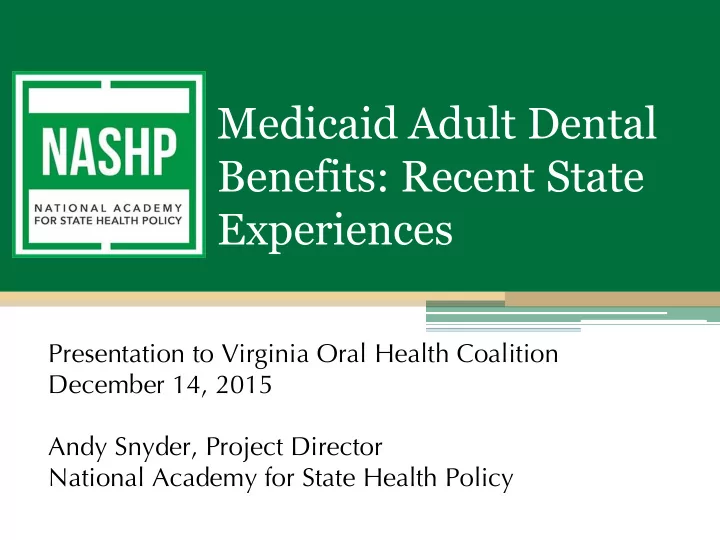

Medicaid Adult Dental Benefits: Recent State Experiences Presentation to Virginia Oral Health Coalition December 14, 2015 Andy Snyder, Project Director National Academy for State Health Policy
2 Children’s health benefits • Medicaid: required under EPSDT ▫ Utilization improving over last 10 years • CHIP: required in 2009 CHIP reauthorization • ACA: pediatric dental benefits are an Essential Health Benefit, but no federal requirement to purchase ▫ CO, KY, NV, WA require purchase ▫ Watch out for expiration of CHIP funding in 2017
3 Medicaid adult dental benefits • Optional coverage for states; highly variable benefits • Frequently reduced or eliminated during times of fiscal pressure Source: Center for Health Care Strategies, 2015.
4 NASHP report and case studies • Explores recent experiences in 7 states that added, reinstated, or enhanced adult dental benefits in the last 2 years ▫ State approaches and goals ▫ Important voices ▫ Key lessons • Case studies ▫ In-depth look at benefit packages, considerations in each state ▫ Data on costs and outcomes (where available)
5 Key themes • Policymakers are learning that oral health matters ▫ Their personal experiences matter ▫ Engaging the right decisionmakers matters ▫ Legislative advocacy matters ▫ Key partners: coalitions, dental associations • Prioritizing oral health funding is another matter ▫ Competing priorities, even with a small price tag ▫ Difficulty booking projected cost-savings ▫ Perpetual vulnerability of benefits
6 States’ approaches to adult dental are varied • Incremental approaches • Building on successes in kids’ programs • Approach to benefit administration: state- administered, carved-out, or included in managed care contracts • Legal or regulatory vehicles • Integration into payment and delivery system reform efforts
7 The “restorers” • Washington • California • Illinois • Massachusetts • Brought back basically the same programs that were cut • Lingering concerns about reimbursement, program administration
8 Washington • FY 2013-2015 biennial operating budget • Implemented: January 2014 • FFS administered by state’s fiscal intermediary • Reinstated extensive benefits for all Medicaid- enrolled adults (benefits were reduced in 2010) • Strong partnerships with stakeholder groups, including state dental association and Washington Dental Service Foundation • Enhanced federal funding available through ACA Medicaid expansion was important factor
9 California • State budget, AB 82 (2013) • Implemented: May 2014 • Managed care in Sacramento and LA; FFS administered by Delta in rest of state • Benefits cut during 2009 $42B deficit ▫ Evidence of increased ER use during cutback • Reinstated most benefits for all Medicaid-enrolled adults, with $1800 annual “soft cap”. Additional services for pregnant women. Price: $70M • Big questions about access, capacity • Separately passed legislation to allow Medicaid reimbursement for Virtual Dental Home; reversal of 2013 rate cut
10 Illinois • State budget, SB 741 (2014) • Implemented: July 2014 • Benefits cut, restored in 1990s; cut again in 2012 • Statewide shift to managed care; multiple dental subcontractors • Reinstated benefits for all Medicaid-enrolled adults. Additional preventive services for pregnant women. • Gov. Rauner proposed to reduce/eliminate adult benefits again in FY2015 budget
11 Massachusetts • Annual state budgets • Implemented: 2013, 2014, 2015 • FFS administered through DentaQuest • “Pendulum swing” of benefits – cut in 2002, 2003, restored in 2006, cut in 2010 • Reinstated services for all adults incrementally – first fillings for front teeth, then all fillings, then dentures. Additional services for I/DD. • During downturns, state Safety Net Pool allowed FQHCs to be reimbursed for some adult services • Legislative Oral Health Caucus – important vehicle for legislator engagement & recognition
12 The “introducers” • Virginia • Colorado • Iowa • Considerations about how dental fits into the state’s approach to health care reform • Some desire to tackle administration, reimbursement, other programmatic barriers
13 Colorado • Vehicle: SB 242 (2013) • Implemented: April 2014 • FFS administered through DentaQuest • 2011: Gov. Hickenlooper identified oral health as one of ten “winnable battles” • Introduced benefits for all Medicaid-enrolled adults, with $1,000 annual cap. • Contract goals on provider participation and reduction in dental ER visits • Funded through a trust fund that previously funded CO’s high-risk pool • Legislature subsequently added denture coverage, raised rates; state is working with CDA on provider recruitment
14 Iowa • Vehicle: Section 1115 Medicaid waiver • Implemented: May 2014 • Dental managed care, administered through Delta • Introduced Dental Wellness Plan “earned benefit” for Medicaid expansion population ▫ Higher reimbursement rates: $22.66 PMPM ▫ Individuals who establish a regular source of care qualify for more expansive benefits. ▫ Leverages experience with I-Smile dental care coordinators • 5-year evaluation to demonstrate shift from restorative to preventive services
15 Courtesy Dr. Bob Russell, IDPH
16 A few other federal developments • Access: ▫ Armstrong v. Exceptional Child Center (2015): providers can’t sue Medicaid agencies to enforce access ▫ New federal Medicaid access rule (2015): states required to evaluate effects on access of scope or rate cuts for fee-for-service Medicaid benefits • Health centers: ▫ California Association of Rural Health Clinics v. Douglas (2013, 9 th Circuit): CA Medicaid must reimburse FQHCs for mandatory services, including adult dental
17 In closing… • Interest in engaging with ways dental coverage might contribute to overall health, states’ health care reform goals • Still working through the particulars of targeted interventions • Good lessons to be learned from experiences with kids’ coverage • But scarce resources are an overarching concern
18 NASHP resources • Briefs, reports, and an online toolkit at http://nashp.org/category/oral_health/ ▫ Adult Dental Benefits in Medicaid ▫ Oral Health and the Triple Aim ▫ Dental and Health Insurance Marketplaces Contact: Andy Snyder asnyder@nashp.org (202) 238-3347 Thank you!
Recommend
More recommend